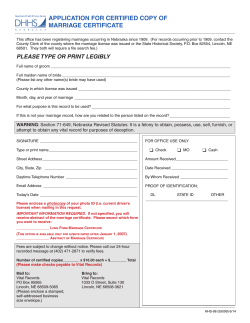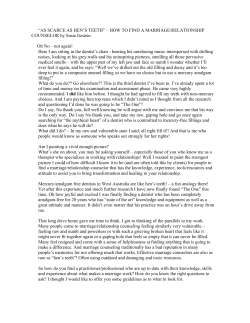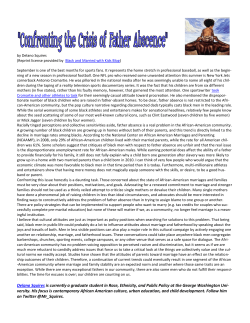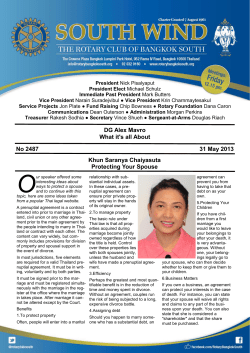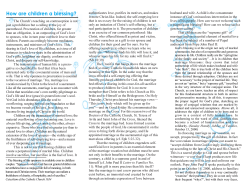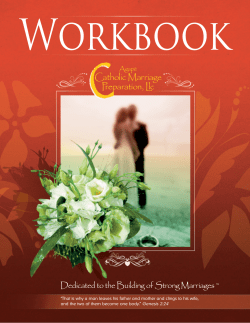
The Marriage Protection Amendment: SB 106—Defense of Marriage
The Marriage Protection Amendment: 10 Reasons Why Legislators Should Let the People Vote Applicable Bills: SB 106—Defense of Marriage BACKGROUND: For seven long years, the people of North Carolina have been denied the opportunity to vote on a constitutional amendment preserving the definition of marriage as the union of one man and one woman. The introduction of SB 106—Defense of Marriage in the 2011 session marks the 8th year that Marriage Protection Amendment legislation has been introduced in the General Assembly. The historic 2010 election changed the political landscape of both the North Carolina House and Senate, giving pro-family citizens in the Tar Heel State great reason to hope that the new leadership of the General Assembly will finally allow consideration of the Marriage Protection Amendment (MPA) legislation this year, and give them the opportunity to vote on the preservation of marriage in November 2012. The overwhelming arguments in favor of a Marriage Protection Amendment for North Carolina have not changed over the past seven years—they have only grown stronger. With an increasing number of states redefining marriage to include same-sex couples, and homosexual activists in this state continuing to push for laws and policies aimed at making it easier to one day legalize same-sex “marriage” here, there has never been a more important time for the people of North Carolina to vote on a MPA. Following is a list of the top 10 reasons the definition of marriage as the union of one man and one woman should be preserved through an amendment to the North Carolina State Constitution. 1. Marriage is a foundational institution of society that is built upon the complementary malefemale union. • Marriage between men and women is found in nearly every human society as far back as historians can trace. Although homosexuality existed in some form in cultures throughout history, heterosexual marriage has always been the norm.1 • Marriage has been universally understood as the publicly recognized union of a man and a woman that is set apart from all other relationships and privileged through law because it creates the best and safest environment for raising children.2 • One of the core purposes of marriage is procreation, and only the sexual union of a man and a woman can naturally create a child. • By the same token, thousands of studies across the social sciences have confirmed that children need both a father and a mother to thrive.3 2. The marital union and the natural family it creates provide a wide array of benefits for individuals and society that no other family form can replicate. • The marital union of a man and a woman provides children with a father and a mother, the central ingredient for raising healthy children and building a strong society. A vast body of research involving children from broken homes, where one biological parent is missing, has found that children do best when raised by their married parents.4 • Sixteen of the nation’s top family scholars have concluded that, “Marriage is an important social good, associated with an impressively broad array of positive outcomes for children and adults alike.”5 For more information, contact the North Carolina Family Policy Council at (919) 807-0800 IB:SB106–110224v2 • • • • The myriad of benefits of marriage for adults include: increased family wealth; less poverty, especially for women; better health and longer life expectancies, especially for men; lower rates of depression, especially for women; less risk of domestic violence, especially for women; and better relationships with children, especially for fathers.6 The benefits for children of growing up with their married opposite-sex parents include: better physical, mental and emotional health; educational success; less drug and alcohol use and abuse; a lower risk of early sexual activity and teen pregnancy; a lower risk of juvenile delinquency and incarceration, especially for boys; and healthier relationships and marriages as adults.7 The same 16 family scholars also concluded that, “Marriage is an important public good, associated with a range of economic, health, educational, and safety benefits that help local, state, and federal governments serve the common good.”8 More children growing up with their own married mothers and fathers results in fewer societal ills, and therefore less reliance on local, state, and federal governments for assistance, such as welfare, child support, and other social services, and the associated and economic costs that place a demand on the state. 3. The historic understanding of marriage is under increasing attack nationwide. • • • • • • • • Five states (Massachusetts, Connecticut, Vermont, Iowa, and New Hampshire) plus the District of Columbia have redefined marriage to include same-sex couples.9 The redefinition of marriage has been achieved only through the courts or by legislative action— never by a vote of the people.10 Legislative efforts to redefine marriage are currently underway in Maryland, Rhode Island, and New York.11 Hawaii and Illinois have legalized “civil unions,” which have proven to be the first step toward the redefinition of marriage in other states with similar laws, such as Vermont, Connecticut, and New Hampshire. Seven states currently extend most or all of the legal rights and economic benefits of marriage to unmarried heterosexual and homosexual couples.12 In an ongoing legal battle that will eventually be decided by the U.S. Supreme Court, homosexual activists are challenging California’s marriage amendment, Proposition 8. In August 2010, U.S. District Judge Vaughn Walker struck down Proposition 8 as unconstitutional. That ruling is being appealed.13 Homosexual advocacy groups have filed several lawsuits challenging the constitutionality of the federal Defense of Marriage Act (DOMA), which defines marriage as only between a man and a woman for federal purposes, and protects states from having to recognize the same-sex “marriages” performed in states where it is legal. In July 2010, a federal judge in Massachusetts ruled that Section 3 of the federal DOMA is unconstitutional. The same judge issued a similar ruling in another lawsuit challenging the federal DOMA. Both decisions are on hold, pending appeal.14 If the federal DOMA is successfully overturned in the courts, it could adversely impact the DOMA laws of 37 states, including North Carolina. 4. Thirty (30) other states, including every southern state except North Carolina, have responded to these attacks on marriage by protecting the definition of marriage through state constitutional amendments.15 • In every state where the definition of marriage has been on the ballot, the measure has been approved by the majority of voters with an average passage rate of 67.3 percent.16 • Whenever the question of redefining marriage is taken out of the hands of politicians and presented directly to the American people, it is soundly rejected. • For example, Maine citizens voted in 2009 to repeal a marriage redefinition law enacted by the state legislature earlier that year.17 For more information, contact the North Carolina Family Policy Council at (919) 807-0800 IB:SB106–110224v2 5. In North Carolina, homosexual activists are slowly chipping away at laws that protect marriage and the family through incremental changes at the state and local levels. These efforts include: • Recent court decisions recognizing same-sex relationships in ways that our laws never have before, such as rulings that grant parenting rights to non-biological homosexual partners;18 • The passage of the School Violence Prevention Act in 2009, which inserted the undefined terms “sexual orientation” and “gender identity” into state law for the first time, giving homosexual activists the opportunity to influence future generations about marriage in our schools;19 • The adoption of domestic partnership policies by an increasing number of counties, cities and towns throughout the state (so far, Mecklenburg, Orange, and Durham counties, and the cities/towns of Durham, Greensboro, Chapel Hill, Carrboro, and Asheville);20 • Efforts to add “sexual orientation” as a protected class to local government non-discrimination policies, as well as efforts to pass a state-level employment nondiscrimination law that includes protections for “actual or perceived sexual orientation or gender identity.” 21 (At the state level, these efforts have thus far been rejected by the General Assembly.) • Laws that include “sexual orientation” and/or “gender identity” as specially protected classes have been cited by the courts in other states—including California, Connecticut, and Iowa—to justify the redefinition of marriage on the grounds that denying same-sex couples the ability to legally marry is a form of “discrimination.”22 6. North Carolina’s marriage laws, while strong, are increasingly vulnerable to legal challenges and revision by the courts. • Although North Carolina law defines marriage as only between a man and a woman, and is further protected through a DOMA law that specifies that same-sex “marriages” performed in other states will not be recognized here, similar laws in other states have proven to be no match for activist judges or politicians who are intent on overturning them.23 • In April 2009, the Iowa Supreme Court struck down Iowa’s marriage laws as unconstitutional. Similar to North Carolina, Iowa had a DOMA law on the books, but lacked a Marriage Protection Amendment.24 • The escalating legal challenges to the federal DOMA pose a significant threat to state DOMA laws, including North Carolina’s. • It is only a matter of time before a lawsuit challenging North Carolina’s marriage laws is filed by one or more same-sex couples from this state that have been legally “married” in D.C. or states where same-sex “marriage” is legal. • The only way to protect North Carolina’s marriage laws from redefinition by the courts is to preserve the definition of marriage as the union of one man and one woman through an amendment to the State Constitution. • A Marriage Protection Amendment would preserve our marriage law in the State Constitution. By passing a bill to place this measure on the ballot, the legislature would be giving the citizens of North Carolina the right to protect the definition of marriage in our State Constitution. 7. The Marriage Protection Amendment is about preservation, NOT discrimination. • • • Opponents have described the Marriage Protection Amendment as a “ban on gay ‘marriage.’” However, it would simply preserve the definition of marriage that has existed throughout history in the State Constitution, making a positive statement about what constitutes a marriage in North Carolina. Marriage by definition is an exclusive institution. Marriage is not open to everyone—for example, children cannot get married (there is an age requirement), certain blood relatives cannot get married (such as siblings), and more than two people cannot legally marry (bigamy and polygamy are illegal). The Marriage Protection Amendment is about preserving the universal institution that for thousands of years and across all civilizations has brought men and women together to create the safest For more information, contact the North Carolina Family Policy Council at (919) 807-0800 IB:SB106–110224v2 environment for raising children. 8. The Marriage Protection Amendment will help preserve the right of parents to transmit core values about sex, gender, and family to their children. • When the legal definition of marriage is redefined to include same-sex couples, thousands of other laws are altered as well—including what is taught in public schools concerning marriage, relationships, gender, and sexuality. • In states where same-sex “marriage” is legal, such as Massachusetts, children are taught in school that homosexuality is normal, and that same-sex unions are the legal and moral equivalent of traditional marriage. • For example, a lesbian teacher in Massachusetts, who teaches sex education to 8th graders, told National Public Radio (NPR) that she answers students’ questions about homosexuality using a chart listing different sexual activities, and then asks them whether two people of the same sex can engage in those activities. She told NPR she asks students, “Can a woman and a woman have vaginal intercourse, and they will all say no. And I'll say, `Hold it. Of course, they can. They can use a sex toy.’” She also said her response to any challenges from parents would be, “Give me a break. It’s legal now.”25 • In 2007, a federal appeals court upheld a district court ruling that an elementary school in Lexington, Mass. was justified in refusing to notify parents about pro-homosexual materials presented in the classroom. The courts agreed with the school district’s argument that the school’s opt-out policy did not apply to instruction on homosexuality and same-sex “marriage,” which is legal in Massachusetts.26 9. The Marriage Protection Amendment is necessary to preserve the freedoms of speech and religion in North Carolina. • Religious freedom and free speech are under attack in countries where same-sex “marriage” is legal, such as Canada and Sweden, where pastors have been punished—and even jailed—for speaking out against the normalization of homosexuality.27 • A 2008 report by the Beckett Fund for Religious Liberty warned that the legalization of same-sex “marriage” in the United States would trigger hundreds of state-level anti-discrimination laws, which would be used to bring lawsuits against religious individuals and organizations that refuse to: hire same-sex individuals, perform same-sex wedding ceremonies or rent their church facilities for that purpose, or rent housing to same-sex couples.28 • In 2006, Catholic Charities of Boston chose to get out of the adoption business rather than place children with same-sex couples as the law required.29 The same thing happened in D.C. in 2010, when Catholic Charities of DC handed over its 80-year-old foster care and public adoption program to a national group, rather than comply with a requirement that children be placed with homosexual couples.30 10. The Marriage Protection Amendment has a broad and diverse base of public support among North Carolinians from both political parties and a variety of religious backgrounds. • The coalition behind the Marriage Protection Amendment consists of a wide range of North Carolinians from a variety of religious, political, and racial backgrounds. • A 2009 survey of 5,009 registered voters in the state—which was commissioned by the North Carolina Family Policy Council—found that 73 percent would be “likely” to vote in favor of a MPA. The poll also found that 71 percent of those polled would be “more likely” to vote for a candidate who supports the MPA.31 • According to a December 2010 poll by the John W. Pope Civitas Institute, nearly two-thirds of North Carolinians support including the definition of marriage in the state constitution. The survey of 600 likely voters found that 65 percent favored “an amendment to the North Carolina constitution defining marriage as between one man and one woman,” while only 32 percent were opposed.32 For more information, contact the North Carolina Family Policy Council at (919) 807-0800 IB:SB106–110224v2 ACTION: Please SUPPORT SB 106—Defense of Marriage to allow North Carolinians to exercise their right to vote on protecting the definition of marriage in the State Constitution. 1 Nathanson, Paul and Katherine K. Young. “Marriage B-La-Mode” Brief to Canadian House of Commons Standing Committee on Westermarck, Edward. A Short History of Marriage. New York, The Macmillan Co., 1926, pg. 3. 3 Glenn, Norval, Steven Nock, Linda J. Waite, et. al., Why Marriage Matters: 21 Conclusions from the Social Sciences. New York: Institute for American Values. See also: ElHage, Alysse, “The Essence of Marriage,” NCFPC Findings, November 2003. 4 Kristin Anderson Moore, et al., “Marriage From a Child’s Perspective: How Does Family Structure Affect Children, and What Can We Do about It?” Child Trends Research Brief, June 2002, p. 1-2. See also: Mary Parke, “Are Married Parents Really Better for Children?” Center for Law and Social Policy Policy Brief, May 2003, p. 1. 5 Institute for American Values, “Why Marriage Matters: 26 Conclusions From the Social Sciences,” Second Edition, http://www.americanvalues.org/html/r-wmm.html 6 Ibid. See also: Morris, John, “The Benefits of Marriage,” Family North Carolina, November/December 2008; Also: Sims, Christina, Why Families Matter: The Need for Husbands, Wives, Fathers and Mothers,” NCFPC Findings, November 2005. Also for a detailed review of the positive effect of both marriage and religion on adults, see: The Mapping America Project, at http://marri.frc.org/get.cfm?it=MA; 7 Ibid. 8 Op. Cit., Why Marriage Matters. 2 9 National Conference of State Legislatures, “Same Sex Marriage, Civil Unions and Domestic Partnerships,” Updated Feb 2010, accessed at: http://www.ncsl.org/IssuesResearch/HumanServices/SameSexMarriage/tabid/16430/Default.aspx 10 ElHage, Alysse, “The Issue That Will Not Go Away: An Update on the Battle Over Marriage Redefinition,” Family North Carolina magazine, Spring 2010. 11 NCFPC, “Marriage Battles Continue,” Special Report, 02/21/11, http://www.ncfamily.org/stories/110221s1.html. See also: Williams, Ken, “Winning the Battle for Marriage Equality, One State at a Time,” San Diego Gay and Lesbian News, 2/18/11, as found at: http://sdgln.com/news/2011/02/18/news-analysis-winning-battle-marriage-equality-one-state-at-time 12 Hawaii as of 2/16/11. NCFPC, “Marriage Battle Rundown,” www.ncfamily.org, Special Report, 2/2/11. See also, for history: National Conference of State Legislatures, “Civil Unions and Domestic Partnership Statutes,” updated January 2010, http://www.ncsl.org/Default.aspx?TabId=4244 13 NCFPC, “9th Circuit Punts Prop 8,” Special Report, 1/6/11, http://www.ncfamily.org/stories/070228s1.html 14 NCFPC, “Judge Says Federal DOMA Flawed,” Special Report, 7/9/10, see http://www.ncfamily.org/stories/100709s2.html 15 National Conference of State Legislatures at: http://www.ncsl.org/IssuesResearch/HumanServices/SameSexMarriage/tabid/16430/Default.aspx *Note that this count includes California, where an ongoing lawsuit challenging the MPA is expected to reach the U.S. Supreme Court, and Hawaii, which amended its constitution in 1998 to read “The Legislature shall have the power to reserve marriage to opposite sex couples.” The Hawaii legislature later passed a law that prohibits same-sex “marriage.” 16 DOMA Watch, “Marriage Amendment Summary,” as found at: http://www.domawatch.org/amendments/amendmentsummary.html 17 Op. Cit., ElHage, “The Issue That Will Not Go Away.” 18 NCFPC, “Court Rules Same-sex Adoption Void,” Special Report, 12/21/10, as found at: http://www.ncfamily.org/stories/101221s1.html; See also: Fitzgerald, Tami, “Joint Custody to Lesbian Couple,” Courts, Family North Carolina, July/August 2008. 19 ElHage, Alysse, “The School Violence Prevention Act: How to Implement the New Law Without Promoting Homosexuality,” Family North Carolina, Winter 2010. 20 NCFPC, “Asheville Council Wants DP Benefits,” Special Report, 2/25/2010, http://www.ncfamily.org/stories/100225s1.html 21 Ribeiro, Paul, “Marriage Laws in North Carolina: Why North Carolina is Not Protected Under Current Marriage Laws,” Family North Carolina, May/June 2009. 22 Ibid. See also: See also, Messner, Thomas, “ENDA and the Path to Same-Sex Marriage,” Backgrounder, The Heritage Foundation, 9/18/2009. 23 NC G.S.§51-1.2 For more information, contact the North Carolina Family Policy Council at (919) 807-0800 IB:SB106–110224v2 24 NCFPC, “Same-Sex ‘Marriage’ Legalized in Iowa,” 4/3/09, as found at: http://www.ncfamily.org/stories/090403s1.html; See also: Varnum v. Brian as found at: http://www.iowacourts.gov/Supreme_Court/Recent_Opinions/20090403/07-1499.pdf 25 NPR Interview, Gay Marriage in Massachusetts and Public Education, http://www.youtube.com/watch?v=wZmNJEibjos&feature=related 26 NCFPC, “Mass. Court Mandates Homosexual Curriculum, Special Report, 2/28/07 http://www.ncfamily.org/stories/070228s1.html 27 Canada example: Baklinkski, Thaddeus, “Pastor Boisson Exonerated: Judge Rules Letter on Homosexuality Not Hate Speech, 12/04/09, at: http://www.lifesitenews.com/ldn/2009/dec/09120407.html. For Sweden example, see: http://www.akegreen.org/ and http://www.alliancedefensefund.org/news/pressrelease.aspx?cid=3587. 28 Laycock, Douglas, Ed., Same-Sex Marriage and Religious Freedom: Emerging Conflicts, The Becket Fund for Religious Liberty, September 2008, see: http://www.becketfund.org/index.php/article/792.html 29 Wen, Patricia, “Catholic Charities Stuns State, Ends Adoption,” 03/11/06, as found at: http://www.boston.com/news/local/articles/2006/03/11/catholic_charities_stuns_state_ends_adoptions/ 30 NCFPC, “DC Issues Homosexual Marriage Licenses,” Special Report, 03/04/10, http://www.ncfamily.org/stories/100304s1.html 31 NCFCP, “Marriage Amendment Poll Released,” Special Report, March 31, 2009, http://www.ncfamily.org/stories/090331s2.html 32 December 2010 Civitas Poll, as found at: http://www.nccivitas.org/2010/december-2010-poll-results-preview/ For more information, contact the North Carolina Family Policy Council at (919) 807-0800 IB:SB106–110224v2
© Copyright 2025
